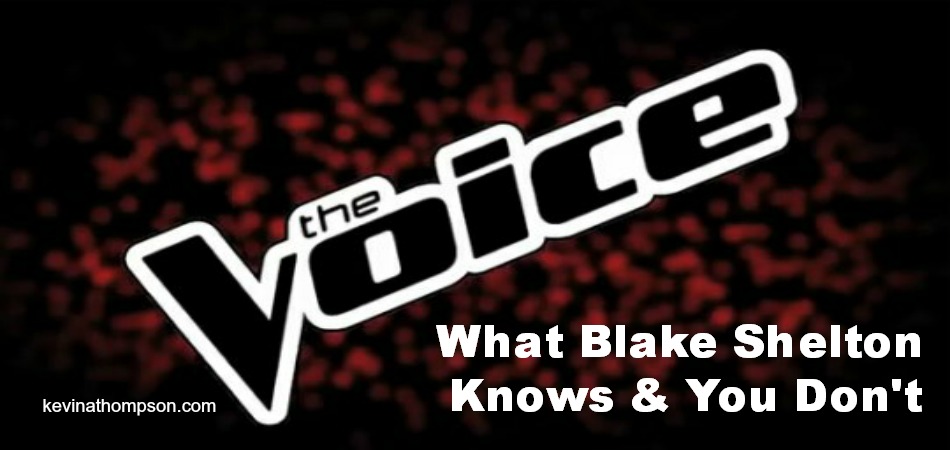Blake Shelton knows something you don’t–what you think is your problem, is not your problem.
Everybody has something—weight, height, background, something. Whenever you look in the mirror or walk into a crowd, there is something that causes you to pause, doubt, and question.
NBC’s The Voice attempts to level the playing field so each contestant is judged by the same standard. With each person singing to the judges’ backs, everyone is evaluated by the same thing—their voice. Whether she is a size 2 or a size 12 doesn’t matter.Whether he is 18 or 48 isn’t a criteria. Whether she is picture perfect or he is rough around the edges, the only thing that matters is the voice.
What I find most interesting about the show is when someone is rejected and they are shocked. You can tell by the look on their faces—they thought they were being held back by something other than their voice. It was their height or weight or imperfect ears or weird nose or awkward social skills or ______ (whatever fills in the blank). The story they have told themselves is that if they could ever just be judged on their voice, everyone would see their ability.
Yet when the opportunity comes, they don’t get chosen. If they are being honest with themselves, they will realize that what they thought was holding them back really wasn’t. (See: Never Hire, or Marry, Someone Who Blames the Umpire)
Humanity is quick to make excuses. Instead of taking personal responsibility for our actions and abilities, we look for another reason that things aren’t going our way. And sometimes that is the case. Racism, sexism, bigotry, and a hundred other biases result in negative outcomes all the time. But sometimes they don’t.
In many situations, what we think is holding us back really isn’t holding us back.
The danger in quickly assuming something other than our ability is keeping us from success is that we stop working, improving, and striving. We focus on what we can’t change and stop working on what we can change. This is a risky gamble.
What if we are wrong? (See: A Map for Navigating Life’s Disappointments)
What if it’s not your looks or your background or greatest insecurity which is holding you back? What if it is your skill?
That’s good news, but it’s also difficult news.
It’s good because you can work on your skill. You can practice and perfect. You seek advisors and experts.
It’s difficult because it requires you to admit you haven’t arrived. You aren’t there yet.
Excuses are easier. If you get skipped over for the promotion because you didn’t have the right last name, nothing is required of you. But if you got skipped over for the promotion because you weren’t good enough, you now have to figure out how to be better. You have to show humility, admit weaknesses, and get better.
On a weekly basis, I speak with people experiencing disappointment. I’m reminded of how quickly we all run to excuses of why life is not going the way we want. Sometimes it is true, but most of the time it is not. (See: Stop Trying to Live a Great Life and Live a Grateful One)
For a good number of us, what we think is our greatest problem isn’t really our problem; it’s our excuse.
Stop making excuses. Stop blaming your weight, looks, lack of name recognition, or anything else which is beyond your control and simply get better. Do more. Practice more. Work harder.
Chances are, what you think is your problem is not your problem. And that is good news if you are willing to do the work to get better.




2 Responses to The Voice: What Blake Shelton Knows & You Don’t